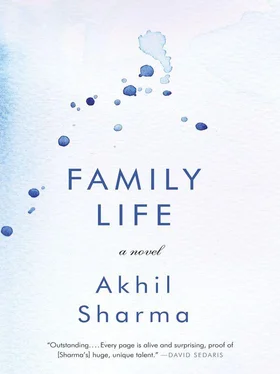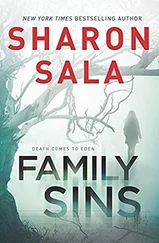We went downstairs to tell Birju the news. My heart was racing. He was lying on his exercise bed. His stomach beneath his pajamas was swollen as if full of gas. The tube from his urinary catheter ran over his thigh to a bag that hung from the side of the bed. “We have fooled them,” I said, taking hold of Birju’s feet. “Brother mine, Mommy has done what she said she would. Get up, brother. How much longer can you keep lying here?”
THAT SPRING I was continuously aware that if the accident had not occurred, Birju would be graduating from college, that he would be applying to medical schools. The awareness was like a physical sensitivity, like when your back is hurting and you are careful all the time how you take a step.
Mrs. Sethi had been one of my mother’s best friends. She had abandoned us. After my father’s drinking became known, she had stopped talking to my mother, stopped visiting us or calling or returning my mother’s phone calls. A part of me recognized that this made sense. Why spend time with strange, troubled, embarrassing people? Why seek problems? But the very fact that this made sense made my embarrassment worse.
Once I got into Princeton, people phoned and asked my mother to bring me to their homes. One of the ones who did this was Mrs. Sethi. She invited us to her house for dinner.
“Hello, sly one,” she said, opening the door when we arrived. Because her husband was a dentist and they were prosperous, she could be a little more American than most people and she was wearing white pants and a blue silk blouse. I saw her and thought, Now you’re not ashamed to acknowledge us .
Dinner was in a room that had an oval wooden table and cupboards with crockery along the walls. There was a chandelier above the table. My mother and I sat on one side of the table and Mr. and Mrs. Sethi on the other. Mr. Sethi was seated opposite my mother. He began the meal by saying, “Thank you for coming. We know it is difficult to leave Birju. We are flattered.”
“If we wouldn’t bother ourselves for you,” my mother said, “who would we bother ourselves for?” My mother smiled broadly, angrily. She turned toward me. Her smile was fixed and was obviously false. “See what good manners Sethi uncle has, to thank someone for coming and eating at his house?”
There was a moment of silence.
Mrs. Sethi broke it by reaching to the center of the table where there were three steel pots. She lifted the lid off one and ladled chickpeas into a ceramic bowl. “Your mother said chickpeas are your favorite.”
“Thank you,” I murmured.
“See how good Sethi auntie is?” my mother said loudly and smiled her wide, angry, false smile.
Nobody spoke. We were all still for a moment and then slowly, arms and hands began reaching across the table. Bowls were filled, and a foil-wrapped stack of rotis was unpeeled, the bread passed around. We started eating. In the quiet, even the way my mother ate, tearing off pieces of roti and jabbing at the subji, seemed angry.
After several minutes, my mother turned to Mr. Sethi. She smiled and nodded as if agreeing with something he had just said. “Give him advice,” she requested. “You know things about America that his father and I don’t know.”
Mr. Sethi looked embarrassed. He had a kind, meek face. “Ajay should keep doing what he’s doing. He should help his parents and his brother.”
“No. No. Give him guidance. Tell him what he needs to know if he is to get a good job.” My mother leaned forward.
Mr. Sethi glanced at his wife as if asking what to do.
“Elder sister,” Mrs. Sethi said, “We should turn to you for guidance. You have raised a boy who has gotten into Princeton.”
“What are you saying? We are lucky to be invited to a house like yours. After what Ajay’s father did, I had no expectations.” My mother’s voice rose. Her anger was now in the open. We stopped eating.
“Sethiji, please give Ajay advice.” My mother’s voice was high and pathetic. “Please give him guidance.”
Mr. Sethi glanced at me.
“Please,” my mother said.
He nodded. “I didn’t know this, Ajay, but in America the color of your belt is supposed to match the color of your shoes.”
My mother leaned forward. “Tell him more,” she said. “This is exactly the sort of thing he needs to know.”
Mrs. Sethi said, “Shuba sister, all the important things you are already teaching him. These are the least important things.”
My mother kept smiling and staring at Mr. Sethi. I felt bad for my mother.
“Learning to eat with a knife and fork is important,” he said. “Before you get a job in America, before you get a good job, the person you will be working for often takes you to lunch or dinner, and then you need to know how to eat with a knife and fork.”
“Wonderful. Wonderful,” my mother said. “I would teach him such things, but I stay in the house all day.”
“That’s enough education for one night,” Mrs. Sethi said.
My mother looked at her. “Please. The poor boy knows so little.” She turned back to Mr. Sethi.
“Mrs. Mishra,” Mrs. Sethi said, sounding irritated.
“I wish I could give him as good advice as your husband,” my mother said, “but what can I do? My head is full of rubbish. I’m nobody.”
“Why did you come if you wanted to fight?”
“How can you expect manners from me, Mrs. Sethi? My husband is a drunk.”
Without finishing dinner, we left the house.
It was dark outside. A half moon that was a scrubbed white hung low over the rooftops. We stood for a minute in Mrs. Sethi’s driveway. We had walked to the Sethis’. My mother opened her purse and took out a slender flashlight. She gave it to me. We started home. As we went down the sidewalk, my mother talked excitedly, angrily. “Even a cow has horns,” she said.
Walking, I remembered that when we lived in India, the electricity would frequently go out at night, and my mother and I and Birju would be going someplace or coming back from someplace. My mother would then take a flashlight out of her purse and give it to Birju. Birju would walk ahead of us. He would guide us. He would wave the flashlight’s beam over the ground. “Follow me,” he would say.

Even when I left for college, shops had begun to open on the ground floors of the old houses that used to line Oak Tree Road where it enters Iselin. People ran businesses from their living rooms. The houses were pressed together and had narrow, fragile front porches that vibrated when you stepped onto them. The old white men and women who lived next door would pull aside their curtains to look at you when you arrived. Inside, there was usually a freezer that contained fish that someone had smuggled from Bengal. The shops carried packets of seeds for bitter gourd and the deep red carrots one finds in India and which are illegal to import. There would be old women in the back who didn’t speak English and who prepared food for parties. Occasionally there was a child watching TV or doing homework.
In my first two years of college, some of the houses were gutted and made into ordinary stores. Others were torn down. I saw all this. I came home perhaps twice a month, bringing laundry and taking back food. I returned so often because my mother would phone crying. She would tell me that there had been no nurse’s aides for seventy-two hours, that she was dizzy and vomiting from exhaustion. She would say, “Birju is bleeding out of his ass. Your father shouts at me when I say we should go to the hospital. He says that he won’t put Birju on a respirator. I say, ‘What does this have to do with a respirator?’”
Читать дальше













